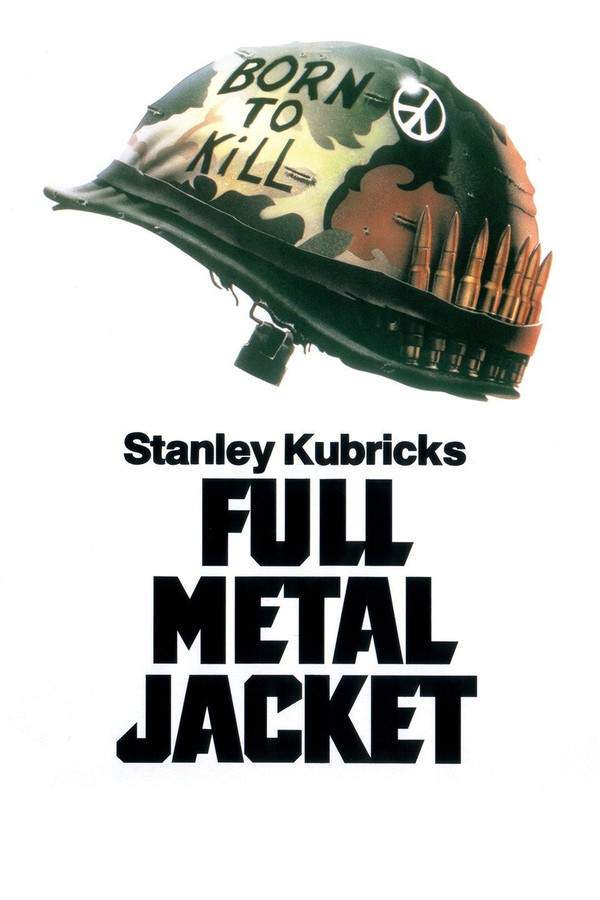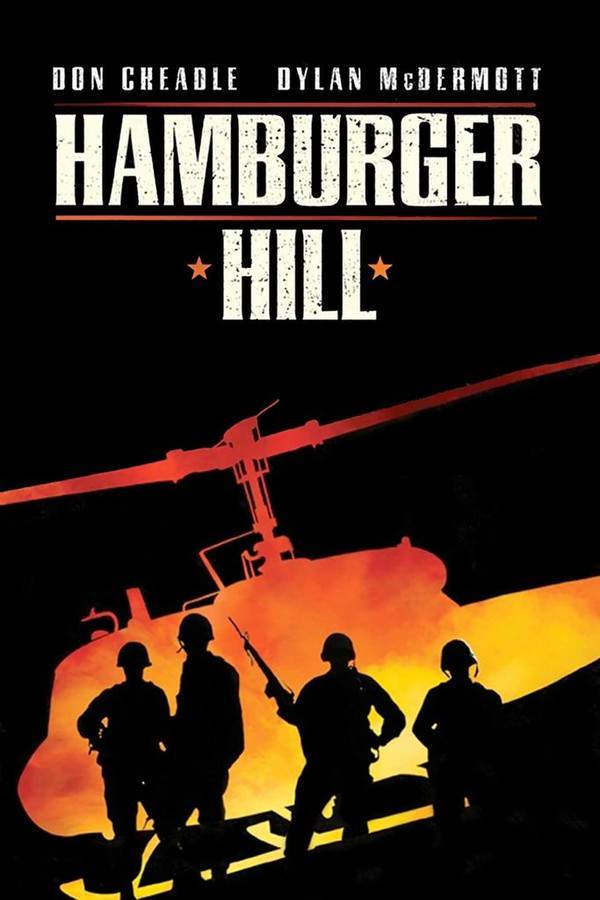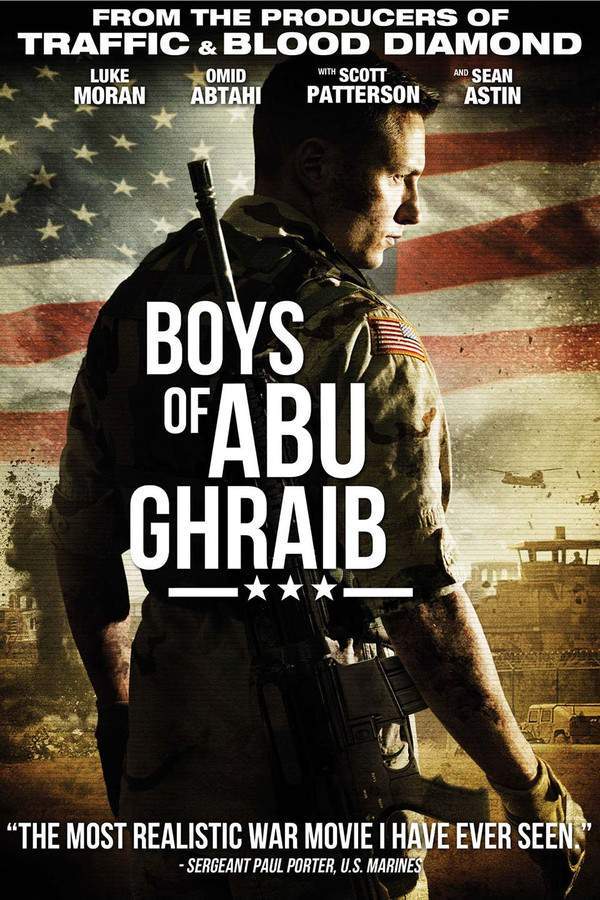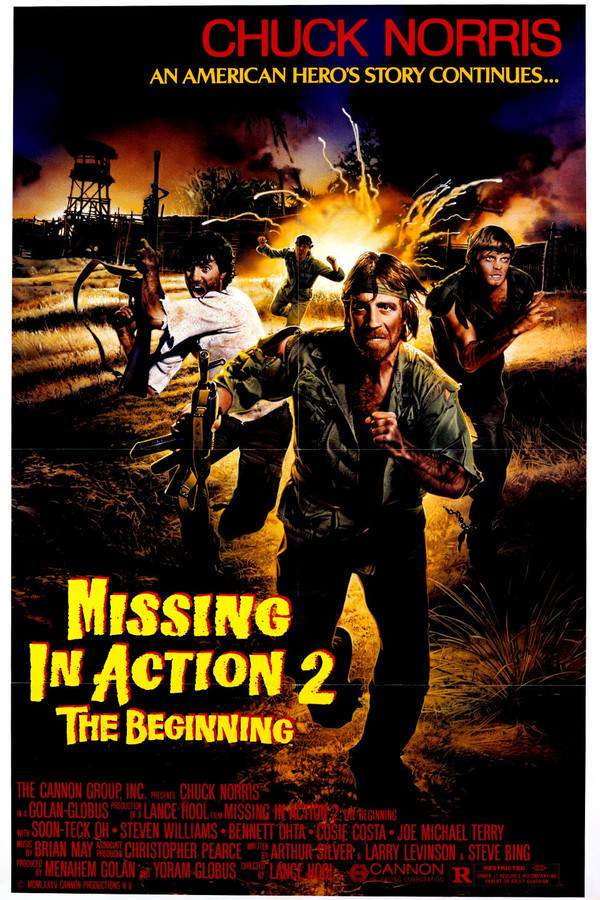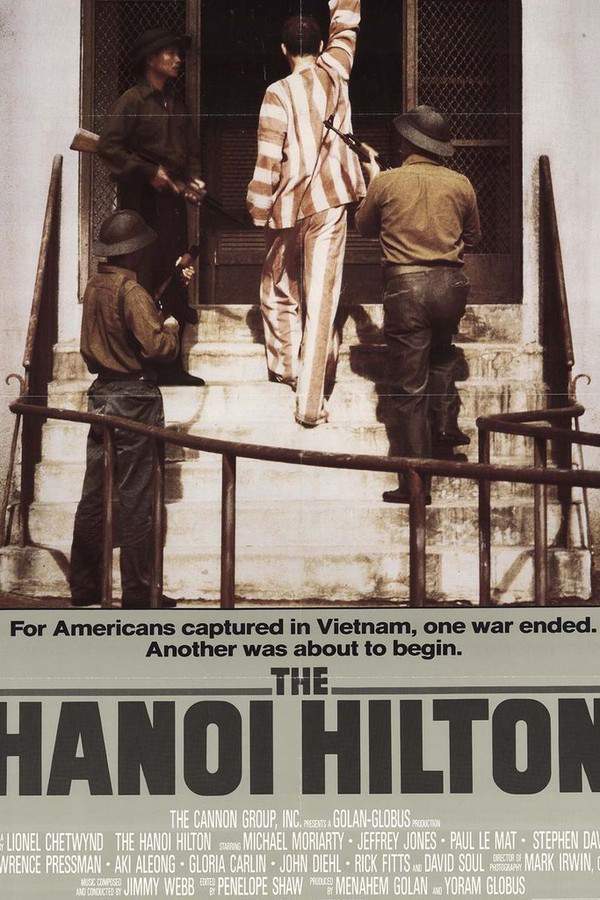
The Hanoi Hilton 1987
Directed by

Lionel Chetwynd
Made by

Cannon Film Distributors
Test your knowledge of The Hanoi Hilton with our quiz!
The Hanoi Hilton Plot Summary
Read the complete plot summary and ending explained for The Hanoi Hilton (1987). From turning points to emotional moments, uncover what really happened and why it matters.
As the camera pulls away from the relentless inquiries of a journalist, we find ourselves aboard an aircraft carrier with LCDR Patrick Michael Williamson (Paul Le Mat), who reflects on his harrowing experiences during the Vietnam War. The scene transitions into an electrifying air raid, where Williamson and his wingman, Mason (Michael Moriarty), navigate the treacherous skies. Unfortunately, their aircraft sustains critical damage, forcing them into an emergency landing in hostile territory. While Williamson miraculously escapes without injury, Mason suffers a grave leg wound, leaving him defenseless against local civilians. In a brutal twist of fate, Mason is murdered, thrusting Williamson into a world of isolation and despair.
Alone and disoriented, Williamson is soon captured and taken to Hoa Lo Prison in Hanoi, where he encounters the enigmatic Major Ngo Doc (Jeffrey Jones). What begins as a series of grueling interrogations quickly devolves into a battle of wills; Williamson remains resolute, revealing nothing but his name, rank, and service number. Frustrated by Williamson’s silence, Ngo Doc resorts to isolation, leaving Williamson in darkness for nearly a year. His solitude is finally shattered when Ngo Doc reappears, announcing the end of Williamson’s isolation.
Upon re-entering the world beyond his cell, Williamson discovers he is not alone. He shares quarters with three other prisoners who have endured similar atrocities. As their collective story unfolds, the film poignantly illustrates the inhumane conditions these officers face: relentless physical and psychological torture, malnutrition, and abject loneliness, all designed to dismantle their spirits. Over the years, they become living testament to the unbreakable human spirit, refusing to surrender to despair even as their suffering deepens.
With the turmoil following the Son Tay prison camp rescue mission and the devastating bombings of Hanoi, the American captives face an uncertain fate. The passing of Ho Chi Minh, a pivotal figure in Vietnam’s history, adds to their unease. In a surprising twist, Ngo Doc reappears, presenting himself as a seemingly benevolent figure, hinting at improved conditions that may soon follow. However, his impending reassignment casts a shadow of ambiguity over the prisoners’ future. They are relocated into a larger shared space, grappling with the reality of their confinement as the final stretch of their ordeal draws near.
As early 1973 approaches, the captives are unexpectedly gathered at a North Vietnamese airfield, greeted by the awe-inspiring sight of a United States Air Force C-141 arriving. This heralds the long-anticipated journey home, filling the air with a mixture of relief, nostalgia, and uncertainty. As they prepare to board the aircraft, Williamson and his fellow prisoners reflect on the profound complexities of war, their harrowing experiences, and the extraordinary resilience of the human spirit.
The Hanoi Hilton Timeline
Follow the complete movie timeline of The Hanoi Hilton (1987) with every major event in chronological order. Great for understanding complex plots and story progression.
Reflection on War
The film opens with LCDR Patrick Michael Williamson reflecting on his traumatic experiences during the Vietnam War. As the camera pulls away from a journalist's relentless inquiries, we gain insight into Williamson's troubled psyche.
Combat Mission
Williamson embarks on an electrifying air raid with his wingman, Mason. As they navigate the treacherous skies, their aircraft comes under attack, leading to a critical situation that changes their fates.
Emergency Landing
Facing severe damage to their aircraft, Williamson and Mason are forced to make an emergency landing in hostile territory. The landing, fraught with danger, marks the beginning of their harrowing ordeal.
Mason's Injury
While Williamson escapes unscathed, Mason suffers a grave leg wound during their emergency landing. This injury leaves Mason vulnerable to the dangers posed by local civilians.
Murder of Mason
In a tragic turn of events, Mason is brutally murdered, leaving Williamson devastated. This pivotal moment thrusts Williamson into a state of isolation and despair, as he grapples with the loss of his friend.
Capture and Imprisonment
Williamson is captured by local forces and taken to Hoa Lo Prison in Hanoi. There, he meets Major Ngo Doc, who will become a central figure in his torment.
Interrogation Begins
Williamson undergoes a series of intense interrogations at the hands of Major Ngo Doc. Despite the relentless questioning, he remains steadfast, revealing only his name, rank, and service number.
Isolation Tactics
Frustrated by Williamson's unwillingness to cooperate, Ngo Doc subjects him to prolonged isolation. For nearly a year, Williamson endures darkness and seclusion, testing the limits of his resilience.
Return to Quarters
When his isolation finally ends, Williamson discovers he is not alone in his suffering. He shares his cell with three other prisoners, all of whom have endured similar horrors of war.
The Prisoners' Bonds
Together, the captives face the brutal conditions of their imprisonment. The film highlights their psychological and physical torture, showcasing their unyielding human spirit amidst despair.
Shifting Conditions
With the backdrop of turmoil after the Son Tay rescue mission, the American prisoners confront an uncertain future. The passing of Ho Chi Minh adds to their sense of unease regarding potential changes.
Ngo Doc's Reappearance
In a surprising development, Ngo Doc returns to the prisoners, presenting himself as a potentially benevolent figure. He hints at improving conditions but raises questions about his true motives with his impending reassignment.
Relocation of Prisoners
The prisoners are moved into a larger shared space, adapting to their new environment while wrestling with the harsh realities of their confinement. The atmosphere remains tense as they sense the end of their ordeal nears.
In the Face of Rescue
As early 1973 approaches, the captives are gathered at a North Vietnamese airfield, filled with a mix of hope and disbelief. The arrival of a United States Air Force C-141 signifies a potential return to freedom.
Reflections Before Departure
As they prepare to board the aircraft, Williamson and his fellow prisoners reflect on their traumatic experiences and the complexities of war. This moment encapsulates both relief and uncertainty as they finally leave their torment behind.
The Hanoi Hilton Characters
Explore all characters from The Hanoi Hilton (1987). Get detailed profiles with their roles, arcs, and key relationships explained.
LCDR Patrick Michael Williamson
LCDR Patrick Michael Williamson is a determined Navy pilot shaped by his harrowing experiences during the Vietnam War. His resilience and refusal to divulge sensitive information under pressure reveal a deep-seated commitment to duty and honor. Throughout his captivity, he endures great suffering yet remains a beacon of hope and strength for his fellow prisoners.
Major Ngo Doc
Major Ngo Doc embodies the complex nature of captor and captives, initially appearing as a ruthless interrogator but later revealing layers of ambiguity in his character. His methods of isolation and psychological manipulation are designed to break down the prisoners' spirits. However, his later behavior suggests a potential shift towards a more benevolent approach, challenging the characters and audiences' perceptions of morality in war.
The Hanoi Hilton Settings
Learn where and when The Hanoi Hilton (1987) takes place. Explore the film’s settings, era, and how they shape the narrative.
Time period
Vietnam War, early 1970s
The Vietnam War was a protracted conflict that lasted from the mid-1950s to 1975, deeply impacting American and Vietnamese societies. In the early 1970s, significant events such as air raids and prisoner rescue missions occurred, while political tensions grew with the passing of influential leaders like Ho Chi Minh. This time period encapsulated the struggles, sacrifices, and moral ambiguities of warfare.
Location
Hoa Lo Prison, Hanoi, Vietnam
Hoa Lo Prison, also known as the Hanoi Hilton, is infamous for housing American POWs during the Vietnam War. Known for its brutal conditions and harsh treatment, the prison became a symbol of the Vietnam War's complexities. The surrounding area of Hanoi reflects the chaos and strife of wartime Vietnam, marked by conflict and enduring resilience.
The Hanoi Hilton Themes
Discover the main themes in The Hanoi Hilton (1987). Analyze the deeper meanings, emotional layers, and social commentary behind the film.
🕊️
Resilience
The theme of resilience is profoundly illustrated through the journey of the prisoners, who endure physical and psychological torment yet refuse to surrender their spirits. Despite the overwhelming despair of isolation and torture, they demonstrate unwavering strength, showcasing the human capacity to survive under horrendous conditions. Their stories are a testament to courage in the face of adversity.
⚔️
War
War serves as the backdrop of the narrative, depicting the brutal realities faced by soldiers and POWs during the Vietnam War. The film explores the psychological toll of combat and captivity, highlighting the complexities of honor, sacrifice, and survival within the chaos of war. This theme emphasizes not just the physical battles, but the mental and emotional struggles endured by those affected.

Coming soon on iOS and Android
The Plot Explained Mobile App
From blockbusters to hidden gems — dive into movie stories anytime, anywhere. Save your favorites, discover plots faster, and never miss a twist again.
Sign up to be the first to know when we launch. Your email stays private — always.
The Hanoi Hilton Spoiler-Free Summary
Discover the spoiler-free summary of The Hanoi Hilton (1987). Get a concise overview without any spoilers.
In the shadow of a relentless war, a U.S. Navy lieutenant commander returns to the present aboard an aircraft carrier, his mind drifting back to the heat‑blistered skies over Vietnam. The film opens with the visceral rush of an air raid, where Patrick Michael Williamson and his wingman Mason are forced to crash‑land in hostile territory, a moment that sets the tone of stark realism and mounting tension. The relentless roar of engines and the stark contrast between the freedom of flight and the crushing weight of the jungle hint at the fragile line between control and chaos that will define the story.
Captured and taken to the infamous Hoa Lo Prison—known to the world as the Hanoi Hilton—Williamson is thrust into a world of dim corridors, unyielding routines, and an atmosphere thick with oppression. The prison itself feels like a character, its oppressive walls and perpetual darkness shaping every breath the inmates take. Amid the cold interrogations, Major Ngo Doc emerges, a figure whose presence commands both fear and a puzzling hint of humanity, embodying the ambiguous power structures at play.
Within the cramped cells, Williamson finds himself among a small, diverse group of officers, each bearing the invisible scars of captivity. Their interactions oscillate between quiet camaraderie and tense silence, creating a tapestry of resilience that is both subtle and powerful. The film’s tone—gritty, introspective, and unsparingly honest—captures the psychological weight of confinement without resorting to graphic spectacle, inviting the audience to sense the strain through muted colors, lingering shots, and the sound of distant footsteps echoing in the night.
As the narrative unfolds, the prisoners cling to fragments of identity and dignity, their shared resolve forming a quiet, defiant echo against the relentless backdrop of war. The story balances the stark brutality of their environment with moments of unexpected tenderness, leaving viewers perched on the edge of anticipation, wondering how far the human spirit can stretch when hope becomes the only viable escape route.
Can’t find your movie? Request a summary here.
Movies with Similar Twists and Themes
Uncover films that echo the narrative beats, emotional arcs, or dramatic twists of the one you're exploring. These recommendations are handpicked based on story depth, thematic resonance, and spoiler-worthy moments — perfect for fans who crave more of the same intrigue.
Featured on this page

What's After the Movie?
Not sure whether to stay after the credits? Find out!
Explore Our Movie Platform
New Movie Releases (2026)
Famous Movie Actors
Top Film Production Studios
Movie Plot Summaries & Endings
Major Movie Awards & Winners
Best Concert Films & Music Documentaries
Movie Collections and Curated Lists
© 2026 What's After the Movie. All rights reserved.


